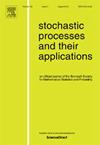有限集上全局优化的群体动力学
IF 1.2
2区 数学
Q3 STATISTICS & PROBABILITY
引用次数: 0
摘要
考虑函数U在有限集合V上的全局优化问题,该集合具有不可约可逆马尔可夫生成器。通过积分,我们将U扩展到V上概率分布的集合P(V),并用一个与时间相关的广义熵泛函来惩罚它。赋予P(V)一个Maas ' wasserstein型黎曼结构使我们能够考虑一个相关的时间非齐次梯度下降算法。有几种方法可以将这个P(V)值的动力系统解释为时间非齐次非线性马尔可夫过程的时间边缘定律,其值为V,每种方法都允许相互作用的粒子近似。该过程将Bolte等人(2023)的连续状态空间群算法方法扩展到离散框架,但这里我们进一步考虑可以证明函数不等式的更一般的广义熵函数。因此,在上述有限框架的充分普遍性下,我们给出了基本时间依赖性的条件,以确保算法收敛于u的全局最小值集所支持的定律。数值模拟表明,人们必须小心选择时间非齐次非线性马尔可夫过程解释。本文章由计算机程序翻译,如有差异,请以英文原文为准。
Swarm dynamics for global optimization on finite sets
Consider the global optimisation of a function defined on a finite set endowed with an irreducible and reversible Markov generator. By integration, we extend to the set of probability distributions on and we penalize it with a time-dependent generalized entropy functional. Endowing with a Maas’ Wasserstein-type Riemannian structure enables us to consider an associated time-inhomogeneous gradient descent algorithm. There are several ways to interpret this -valued dynamical system as the time-marginal laws of a time-inhomogeneous non-linear Markov process taking values in , each of them allowing for interacting particle approximations. This procedure extends to the discrete framework the continuous state space swarm algorithm approach of Bolte et al. (2023), but here we go further by considering more general generalized entropy functionals for which functional inequalities can be proven. Thus in the full generality of the above finite framework, we give conditions on the underlying time dependence ensuring the convergence of the algorithm toward laws supported by the set of global minima of . Numerical simulations illustrate that one has to be careful about the choice of the time-inhomogeneous non-linear Markov process interpretation.
求助全文
通过发布文献求助,成功后即可免费获取论文全文。
去求助
来源期刊

Stochastic Processes and their Applications
数学-统计学与概率论
CiteScore
2.90
自引率
7.10%
发文量
180
审稿时长
23.6 weeks
期刊介绍:
Stochastic Processes and their Applications publishes papers on the theory and applications of stochastic processes. It is concerned with concepts and techniques, and is oriented towards a broad spectrum of mathematical, scientific and engineering interests.
Characterization, structural properties, inference and control of stochastic processes are covered. The journal is exacting and scholarly in its standards. Every effort is made to promote innovation, vitality, and communication between disciplines. All papers are refereed.
 求助内容:
求助内容: 应助结果提醒方式:
应助结果提醒方式:


